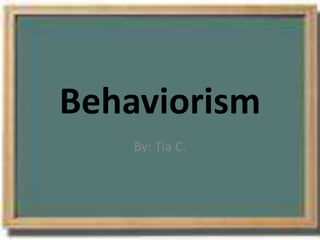
Tia C Learningtheory
- 1. Behaviorism By: Tia C.
- 2. Definition Behaviorism A worldwide view that all behavior is caused by a person responding to a stimuli. All behavior can be explained without knowing a person’s mental thoughts or feelings. People learn to behave through positive and negative influences.
- 3. Behaviorists such as Ivan Pavlov, B.F. Skinner, and Albert Bandura all supplied us with information which helps us know and classify Behaviorism in every day human activity.
- 4. Ivan Pavlov (1849-1936) Famous for behavioral experiments with dogs - His experiment consisted of training a dog to salivate when the doorbell rang. He continuously rang the doorbell and provided the dog with food; until the dog began associating the doorbell ringing with food and therefore began to salivate. Won Nobel Prize for Physiology in 1904 Termed “classical conditioning”
- 5. B.F. Skinner (1904-1990) Famous for conducting experiments with pigeons - His experiment consisted of having a pigeon move in the way he wanted, and then rewarding them. He was eventually able to make them dance and perform other complex tasks. Believed that people shape their behavior based on rewards and positive feedback Termed “operant conditioning”
- 6. Albert Bandura (1925- ) Famous for studies involving T.V. commercials - His studies suggested that when a person buys something after seeing it on T.V., they mimic the actions performed in the commercial, therefore using that behavior as an example and model for themselves and their actions. Known for ideas on social learning, aka “Social Cognitive Theory” Termed “observational modeling”
- 7. Teachers & Students-Behaviorism Operant Conditioning w/out using technology - When a teacher asks a question and rewards the student with a piece of candy when they answer correctly. Eventually training the students to provide the right answers so they can obtain their reward. Observational Modeling w/ technology - When a video is shown in class with students who are behaving and participating correctly. After watching, the students mimic the kids in the video because they are told what they are doing is right.
- 8. My Opinion Agree with Pavlov, but I believe that classical conditioning works better on animals than people Agree with Skinner, teaching someone to do something is easier when they remember the rewards they received last time Agree with Bandura, same goes for pictures of models in magazines etc., people always want to copy other people